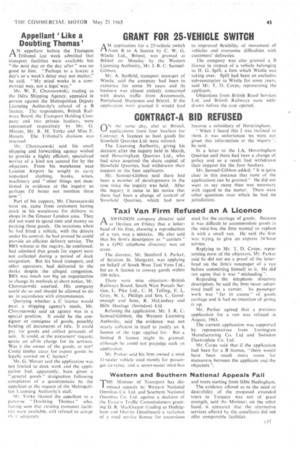Appellant Like a Doubting Thomas'
Page 45

If you've noticed an error in this article please click here to report it so we can fix it.
AN appellant before the Transport Tribunal last week admitted that transport facilities were available but " the next day or the day after" was no good to him. "Perhaps to a lawyer a day's or a week's delay may not matter," he said. "My mind works in a commercial way, not a legal way."
Mr. W. F. Choroszewski, trading as the Odra Shipping Agency, appealed in person against the Metropolitan Deputy Licensing Authority's refusal of a B licence. The respondents, British Railways Board, the Transport Holding Company and two private hauliers, were represented respectively by Mr. G. Mercer, Mr. R. M. 'Yorke and Miss E. Havers. The Tribunal's decision was reserved.
Mr. Choroszewski said his small shipping and forwarding agency wished to provide a highly efficient, specialized service of a kind not catered for by the objectors. From his warehouse near London Airport he sought to carry unpacked clothing, books, wines, machinery and "other things not mentioned in evidence at the inquiry so perhaps I'd better not mention them now ".
Part of his support, Mr. Choroszewski went on, came from customers having stock in his warehouse for delivery to shops in the Greater London area. They did not want to spend time and money on packing these goods. On occasions when be had hired a vehicle, with the drivers under his control, he had proved he could provide an efficient delivery service. The BRS witness at the inquiry, he continued, had admitted that goods for export were not collected during a period of dock congestion. But his hired transport, and other operators, had delivered to the docks despite the alleged congestion. BRS was much too big an organization to change its methods at short notice, Mr. Choroszewski asserted. His company could do so and should be allowed to do so, in accordance with circumstances.
Querying whether a C licence would meet a shipping agency's needs, Mr. Choroszewski said an agency was in a special position. It could be the consignor or consignee of goods, possibly holding all documents of title. It could pay for goods and collect proceeds of sale. It could, at the customers' request, quote an all-in charge for its services. Was it the owner of the goods, or not? Could timber cases for export goods be legally carried on C licence?
Mr. G. Mercer said the application was not limited to dock work and the application had, apparently, been given a "general goods" designation following .completion of a questionnaire by the appellant at the request of the Metropolitan Licensing Authority's staff.
Mr. Yorke likened the appellant to a perverse " Doubting Thomas" who, having seen that existing transport facilities were available, still refused to accept r adequacy.
























































































































